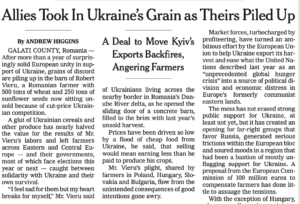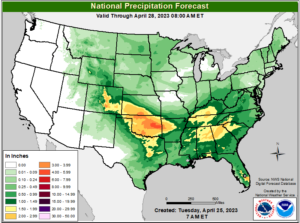President Donald Trump on Friday signed an executive order temporarily expanding the amount of beef the U.S. can import from Argentina, a move the White House says is aimed at…
Kremlin Sees No Progress on Black Sea Grain Deal, as Political Division Surrounding Ukrainian Farm Exports Continues; Wheat Prices at 21-Month Low
Reuters News reported today that, “The Kremlin reaffirmed its position on Tuesday that the Black Sea grain deal is not working for Moscow, a day after the head of the United Nations handed Russia a letter with proposals to improve and expand it.
“‘Despite the fact that so much time has passed, (the deal) has not yet been implemented, it has not come together as a package, the conditions that concerned us have still not been realised,’ Kremlin spokesman Dmitry Peskov told reporters.
“‘Therefore, while the circumstances don’t add up in favour of this deal, we continue to observe,’ he said.”
The Reuters article indicated that, “On Monday, a U.N. spokesperson said United Nations Secretary-General Antonio Guterres had proposed to Russian President Vladimir Putin a ‘way forward aimed at the improvement, extension and expansion” of the agreement.'”
Bloomberg News reported yesterday that, “Russia sees no progress in meeting its demands regarding implementation of the Black sea grain initiative, said Foreign Minister Sergei Lavrov after his talks with United Nations Secretary General Antonio Guterres.”
Bojan Pancevski and Ian Lovett reported in today’s Wall Street Journal that, “Former Russian President Dmitry Medvedev said approval of a proposed Group of Seven ban on Russian exports would mean the end of a deal that allows the export of grain from Ukraine through the Black Sea. There is significant skepticism within the G-7 about a Russian export ban.
“The deal, which has allowed for the export of more than 28 million tons of grain from Ukraine since it was signed last July, has come under increasing strain in recent weeks, as both sides gear up for an expected Ukrainian offensive in the country’s southern agricultural heartland.
“Russia has repeatedly threatened to back out of the agreement, citing what it says are obstacles to its own food and fertilizer exports due to Western sanctions imposed on the Kremlin.”
Also today, Bloomberg News reported that, “Russia blamed Ukraine for drone attacks it said could put a UN-brokered deal for grain shipments at risk.
“Russia’s Defense Ministry said unmanned boats targeted the Black Sea Fleet station in Sevastopol and civilian infrastructure in Crimea. It was not immediately possible to verify the information.”
And Andrew Higgins reported in today’s New York Times that, “Market forces, turbocharged by profiteering, have turned an ambitious effort by the European Union to help Ukraine export its harvest and ease what the United Nations described last year as an ‘unprecedented global hunger crisis‘ into a source of political division and economic distress in Europe’s formerly communist eastern lands.”
“A proposal from the European Commission of 100 million euros to compensate farmers has done little to assuage the tensions,” today’s article said.

Higgins explained that, “When the European bloc announced last June that it was lifting tariffs and other barriers on Ukrainian farm products, the move was welcomed as a bold response to Russia’s blockade and bombardment of Ukraine’s main ports on the Black and Azov Seas. The disruption had raised fears that, cut off from Ukraine’s breadbasket, countries in Africa, the Middle East and parts of Asia might starve.”
“The plan largely worked. It helped get millions of tons of Ukrainian grain onto the global market, easing prices and averting hunger in other countries. But the flood of Ukrainian foodstuffs into nearby countries like Romania, itself a major grain producer, hammered local farmers. They found themselves squeezed out of transport hubs and unable to compete with supplies from Ukraine, free of the costly restrictions and quality-control demands imposed by the European Union,” the article said.
Meanwhile, Reuters writer Pavel Polityuk reported today that, “Ukraine’s wheat exports are likely to fall 37% to 8.8 million tonnes in the 2023/24 July-June season due to an expected drop in the harvest and ending stocks, APK-Inform consultancy said on Tuesday.”
The latest Kansas drought map issued this morning. Unfortunately, Exceptional Drought persists across generally the southwest half of Kansas. Amazingly since March 1st, Wichita has only recorded 0.30 inches precipitation, which is the driest since 1936! #kswx pic.twitter.com/OfrHEaDPQ3
— NWS Wichita (@NWSWichita) April 20, 2023
Elsewhere, Reuters writer Julie Ingwersen reported yesterday that, “The U.S. Department of Agriculture on Monday rated 26% of U.S. winter wheat in good to excellent condition, the lowest for this time of year since 1989, due to prolonged drought.”

However, Reuters writer Naveen Thukral reported today that, “Chicago wheat lost more ground on Tuesday, with prices dropping to their lowest in almost two years on forecasts of much-needed rains in U.S. winter grain regions where crops have deteriorated amid a severe drought.”





